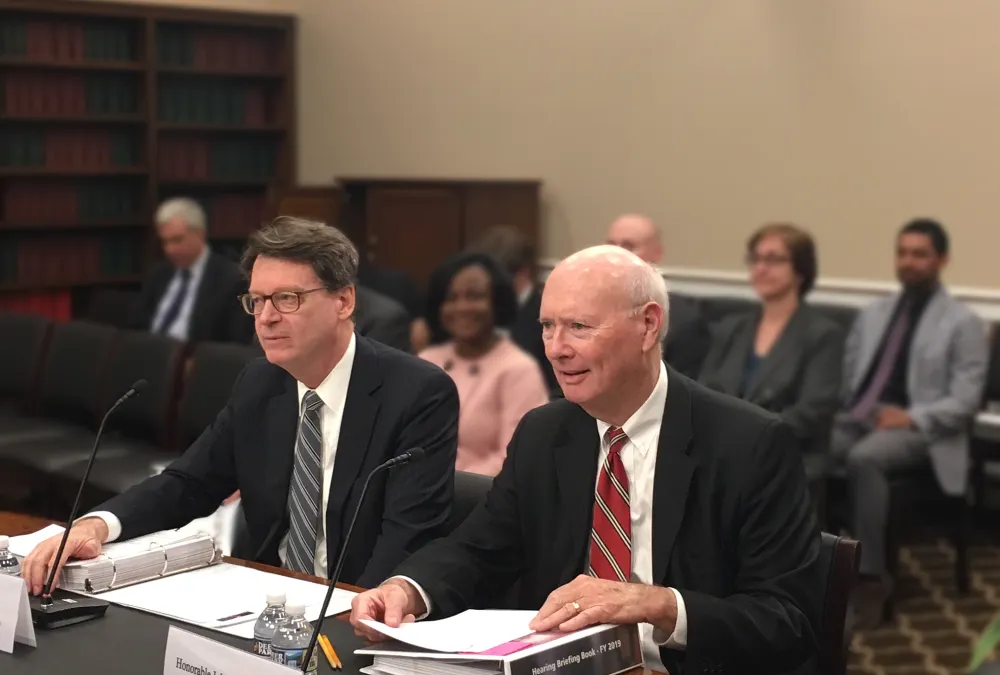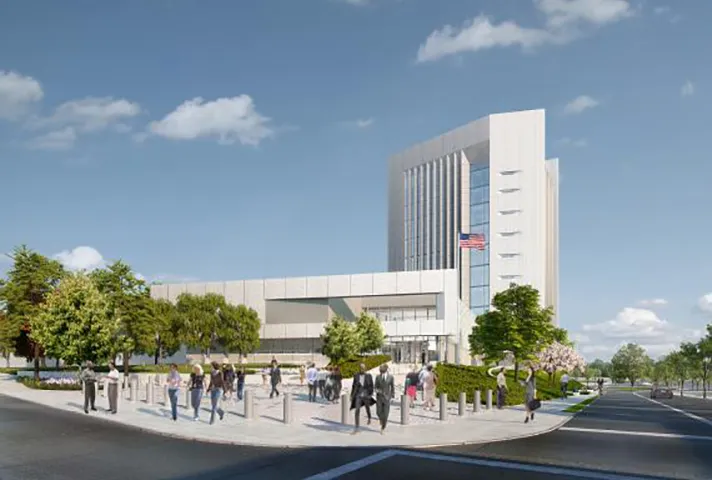Congress appropriates funds for the Judiciary to carry out its constitutional duties and also provides funds to the General Services Administration for courthouse construction and maintenance. The Judiciary is committed to spending public funds in a responsible and cost-efficient way.
Congressional Testimony on Fiscal Year 2019 Appropriations
Representatives of the federal Judiciary in April 2018 asked Congress to provide $7.22 billion in fiscal year 2019 to fund continuing operations of the judicial branch. The request included funding to sustain cybersecurity initiatives and ensure sufficient security at federal courthouses.
“We ask that you consider the Judiciary’s unique constitutional role in our system of government,” Judge John W. Lungstrum, chair of the Judicial Conference Committee on the Budget, testified. “In return, we commit to you that we will continue to be good fiscal stewards, cutting costs where possible, spending each dollar wisely, and making smart investments to achieve long-term savings.”

AO Director James C. Duff and Judge John W. Lungstrum present the Judiciary’s budget request for FY2019 to the House Appropriations Subcommittee on Financial Services and General Government.
Lungstrum testified before the House Appropriations Subcommittee on Financial Services and General Government. He was joined by James C. Duff, Director of the Administrative Office of the U.S. Courts. They presented the Judiciary’s budget request for fiscal year 2019, which began on Oct. 1, 2018.
“I would like to acknowledge the subcommittee for its generous and consistent support of the Judiciary’s needs,” Duff said. “We hope to maintain your confidence and support through another year of successful performance of our constitutional and statutory duties and efficient stewardship of taxpayer resources through the continuation of our longstanding cost containment program.”
The fiscal year 2019 budget request reflected the Judiciary’s efforts to maintain current services and to fund priority initiatives. For example, the Judiciary requested a total of $95 million for cybersecurity as it continues to maintain and upgrade IT security protections.
The branch also sought increases for the defender services program to handle projected caseload and other priorities; additional funding to improve courthouse security; and funding to update the Probation and Pretrial Case Tracking System (PACTS), a national integrated database that helps probation and pretrial services officers supervise people assigned to pretrial and post-conviction supervision.
Fiscal Year 2019 Funding for the Judiciary
Most of the federal government, including the Judiciary, began the fiscal year on Oct. 1, 2018 operating under a series of continuing resolutions to keep government agencies open pending final action on unfinished appropriations bills. A continuing resolution expired at midnight on Dec. 21, 2018, without an agreement to complete work on the unfinished spending bills or to extend the continuing resolution, resulting in unfunded parts of the government shutting down the following day, Dec. 22. The Judiciary was able to use available court fee balances and other funds not dependent on a new appropriation to continue regular operations through Feb. 1, 2019. In late January, Congress passed a stopgap funding measure that ended the partial government shutdown, and then three weeks later, approved the Consolidated Appropriations Act of 2019, which the president signed into law on Feb. 15, 2019. It provided $7.25 billion in full-year appropriations for the Judiciary, a 2 percent increase over FY 2018.
The bill earlier made it through several steps in the process. On July 19, 2018, the House of Representatives passed the FY 2019 Financial Services and General Government (FSGG) appropriations bill as part of a two-bill package (H.R. 6147). The FSGG bill included funding for the Judiciary, the General Services Administration (GSA), the Treasury Department, and other agencies. It provided the Judiciary with $7.27 billion in discretionary appropriations, a $155 million, or 2.2 percent, increase above the previous fiscal year’s funding level and an amount in line with the Judiciary’s budget request.
The Senate approved its version of the FSGG bill on Aug. 1, 2018, as part of a four-bill package (S. 3107). It provided $7.25 billion, a $140 million, or 2 percent, increase above FY 2018 and $15 million below the House-passed level. Funding at either the House or Senate level would support current Judiciary services, four new magistrate judgeships and associated staff, efforts to replace the Probation and Pretrial Services Automated Case Tracking System, and infrastructure costs related to ongoing courthouse construction projects.
Fiscal Year 2018 Funding for the Judiciary
In March 2018, the president signed into law the Consolidated Appropriations Act of 2018, which included fiscal year 2018 funding for the Judiciary. The legislation provided $7.1 billion in discretionary appropriations, an overall increase of 2.7 percent above FY 2017 levels and a sufficient amount for the Judiciary to maintain current services and make improvements in some of its operations. It included funding for several Judiciary priorities, including an increase in the daily juror attendance fee from $40 to $50, the first such increase since 1990, and an $8 hourly rate increase (to $140 an hour) for private attorneys appointed by federal courts to represent indigent defendants under the Criminal Justice Act in non-capital cases.

This is a rendering of the new federal courthouse in Harrisburg, PA. Construction began in late 2018 and is expected to be completed in 2021.
Courthouse Funding
The Consolidated Appropriations Act of 2018 bill included $437 million for the GSA to build three new courthouses identified as the top priorities in the Federal Judiciary Courthouse Project Priorities for FY 2019: Harrisburg, PA ($137 million, after receipt of $55.5 million from previous appropriations bills); Huntsville, AL ($110 million); and Fort Lauderdale, FL ($190 million). The three existing courthouses have significant security issues, with prisoners, judges, and the public all using the same elevators and hallways. They also lack sufficient courtroom space. The Huntsville courthouse, built in 1936, has only one stairwell, creating life safety issues in the event of a fire or other emergency. The Fort Lauderdale courthouse is located in an adapted commercial office building not designed for use as a court.
In addition to the new courthouse funding, the 2018 appropriations legislation included $20 million for the Judiciary’s Capital Security Program. The program is aimed at resolving security deficiencies in existing courthouses in cases where construction of a new courthouse is not needed or expected in the foreseeable future. The FY 2018 funds will be used for the federal courthouse in San Juan, Puerto Rico, to construct a secure judges’ parking garage and a secure elevator.
Annual Report 2018
- Annual Report 2018
- Funding/Budget
- The Courts and Congress
- The Federal Bench
- Accountability and Resource Management
- Facilities and Security
- Public Outreach
- Court Operations and Case Management
- Defender Services
- Probation and Pretrial Services
- Human Resources
- Information Systems and Cybersecurity
- Recent and Proposed Amendments to Federal Rules
- In Profile
